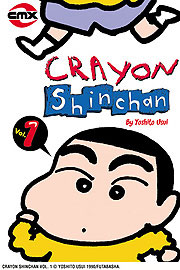 A Japanese version of Dennis the Menace is the simplest description to give this character. However, his antics are cruder than Dennis, Calvin or Bart Simpson (combined) but he’s tamer than Eric Cartman; Shin-chan may ridicule the poor yet he hasn’t had anyone’s parents murdered.
A Japanese version of Dennis the Menace is the simplest description to give this character. However, his antics are cruder than Dennis, Calvin or Bart Simpson (combined) but he’s tamer than Eric Cartman; Shin-chan may ridicule the poor yet he hasn’t had anyone’s parents murdered.
Shin-chan is a Japanese term of endearment for Shinnosuke like Tommy is for Thomas. He resides in the outer suburbs of Tokyo with his parents Misae and Hiroshi. When he’s not in kindergarten tormenting his classmates and teacher, Shin-chan drives his mother crazy with his pleas for candy, not doing his chores and expected bad behavior for a kid his age. He still has plenty left in the tank to frustrate his dad at night and on weekends. Some example stories involve setting off fireworks in the house, “helping” Mom with the laundry, hitting on college girls in front of Dad (who he gets it from) or mooning a video camera in a department store. It’s some coarse stuff on par with a standard Adam Sandler gross-out film yet it’s more reflective of Japanese humor; it’s OK when children do these things, they’re exempt from the social norms adults must follow.
Like most, I was introduced to the five-year-old scourge through the Cartoon Network’s Adult Swim programming block. On TV, the animated version is amusing and provides a few chuckles. It also appears dated; I may not be a Japanese cultural expert but their fashion trends from the Nineties were recognizable as they were parallel to ours in the States. The modernization of the jokes feels strained despite the script doctoring of Evan Dorkin and Sara Dyer (they did a great job on Space Ghost Coast 2 Coast). Still, I took a gamble on the printed version because I figured it was closer to Yoshito Usui’s original work and vision.
The comics are much funnier, if not nastier (little children are messy and blunt). Usui keeps each story consistently to three pages with the equivalent of a punch line at the end. The printed version also gives side notes explaining the cultural references which always feel like an awkward interruption on TV, hence they’re ignored or covered up with Americanisms. Parents of small children might find the humor too close to home though. A kid taking a whiz during a bath seems funny until you’re the one stuck cleaning it up.
These little digests are good for killing time or bathroom reading (aka the Library as my family called it). They’ve been nice conversation pieces with my Japanese co-workers when I need a joke explained (what’s the taboo over sweet potatoes) or useful aids to assist friends learning the language. I mainly keep them around to be part of my loaner library to share alongside Identity Crisis.
